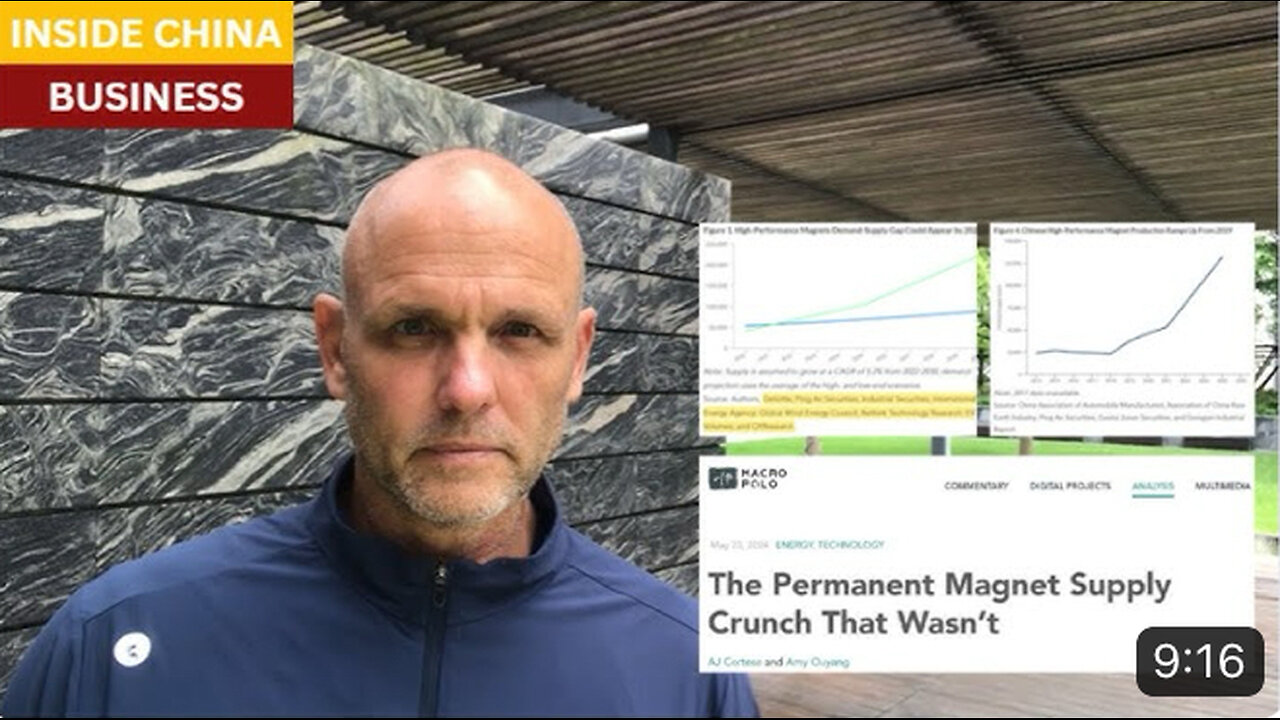Premium Only Content

Video: Magnets, Chinese shortages that never happen
Video: Magnets, Chinese shortages that never happen, why our investors read WSJ & report by US equity firms lose money as they are so behind on the happening in China 磁鐵、中國從未發生過的短缺,以及為什麼我們的投資者閱讀《華爾街日報》和美國股票公司的報告而虧損,因為他們對中國發生的情況完全無知!
https://macropolo.org/analysis/permanent-magnets-case-study-industry-chinese-production-supply/
https://macropolo.org/analysis/the-permanent-magnet-supply-crunch-that-wasnt/
https://www.adamasintel.com/rare-earth-magnet-market-outlook-to-2040/
Sell-side Wall Street and Private Equity firms routinely prepare alarming reports of pending supply shortages for key raw materials or technologies. Other reports are reported for government consumers, by consulting firms representing major industry players hoping for large government subsidies to assist their own companies.
Typically these reports involve one of two main ideas: Chinese companies have a stranglehold on a particular industry and for national security reasons, domestic alternatives need to be created; or, that China faces a hard ceiling in their own ability to supply, which necessitates the same result, of creating home-grown supply at staggering cost.
Before committing private or public capital to these themes, investors should ask two key questions. First, is China unaware of the production limitations for a key function or process, which can be exploited at all? Second, assuming China is aware of their production constraint issues, is Chinese industry unable to solve them, or otherwise innovate them away?
華爾街和私募股權公司的賣方通常會就關鍵原材料或技術即將出現的供應短缺問題準備令人震驚的報告。 其他報告是由代表主要行業參與者的顧問公司為政府消費者報告的,這些參與者希望獲得大量政府補貼來幫助自己的公司。
通常,這些報告涉及兩個主要觀點之一:中國公司對某個特定產業有控制力,出於國家安全原因,需要創建國內替代方案;或者,中國自身的供應能力面臨硬性上限,這必然導致同樣的結果,即以驚人的成本創造本土供應。
在將私人或公共資本投入這些主題之前,投資者應該問兩個關鍵問題。 首先,中國是否沒有意識到可以利用的關鍵功能或製程的生產限制? 其次,假設中國意識到自己的生產限制問題,中國工業是否無法解決這些問題,或以其他方式創新.
-
 1:20:41
1:20:41
TRAGIKxGHOST
2 hours agoTrying to get SCARED tonight! | Are You SCARED!? | Screams Beyond Midnight | Grab a Snack
6.17K2 -
 LIVE
LIVE
StuffCentral
4 hours agoI'm baaack (no you can't play with me.. unless you a healer)
128 watching -
 2:25:11
2:25:11
TheSaltyCracker
5 hours agoTrump Is Not Dead ReEEeStream 8-31-25
70.9K108 -
 3:09:16
3:09:16
THOUGHTCAST With Jeff D.
3 hours ago $0.67 earnedLabor Day Weekend FORTNITE With THOUGHTCAST Jeff & the squad
11.7K4 -
 3:44:05
3:44:05
Rallied
6 hours ago $4.00 earnedSolo Challenges All Day
40.5K1 -
 LIVE
LIVE
iCheapshot
6 hours ago $0.20 earnedCall of Duty: Black Ops Campaign
40 watching -
 4:39:16
4:39:16
Meisters of Madness
7 hours agoMadness in a Pod
7.59K1 -
 1:25:44
1:25:44
HELMETFIRE
4 hours ago🟢GAMING WITH FIRE EP9🟢
7.91K -
 1:24:08
1:24:08
Jean-Claude@BeyondMystic
15 hours ago🌀 THE WACKY WOO SHOW 3I ATLAS ALIEN INVASION with DICK ALLGIRE & JC - AUG 31 , 20254
47.4K64 -
 2:26:21
2:26:21
vivafrei
14 hours agoEp. 279: Patel's GF Sues for Defamation! Rogue Judges vs. Trump! Raja Jackson, Kick Stream & MORE!
143K82